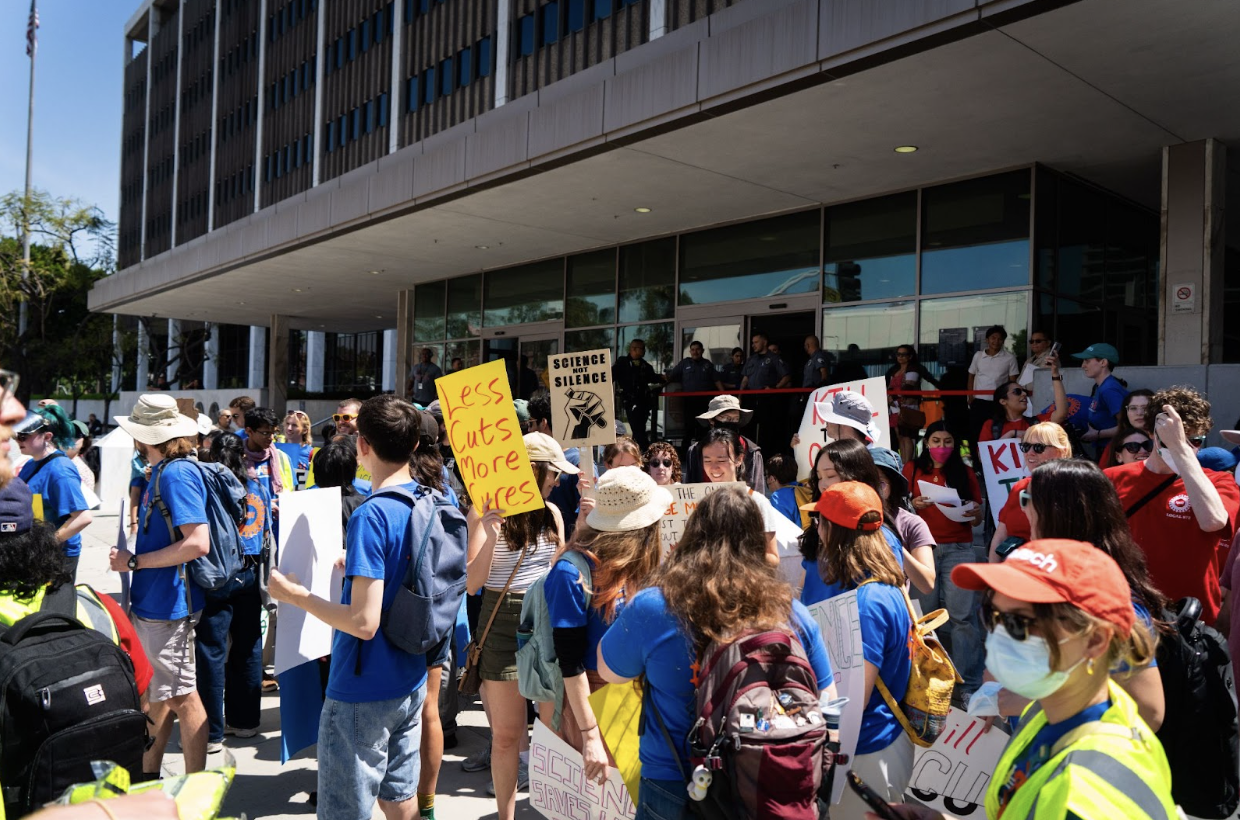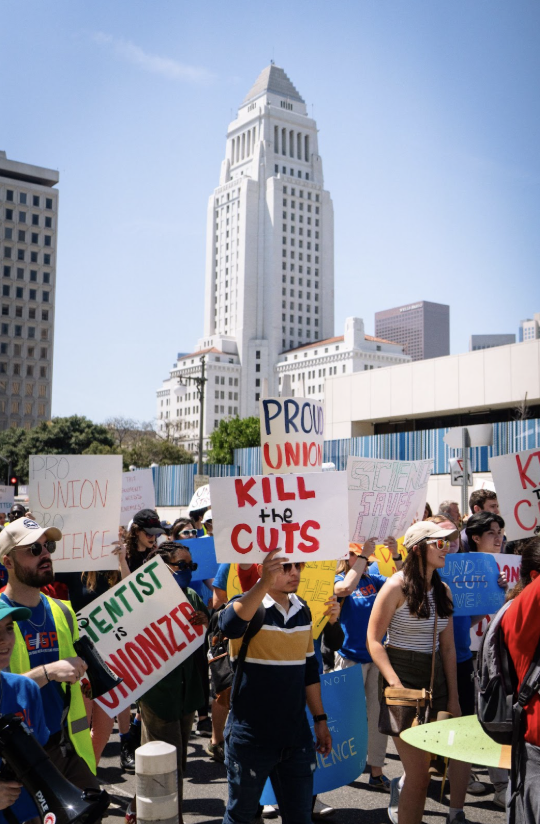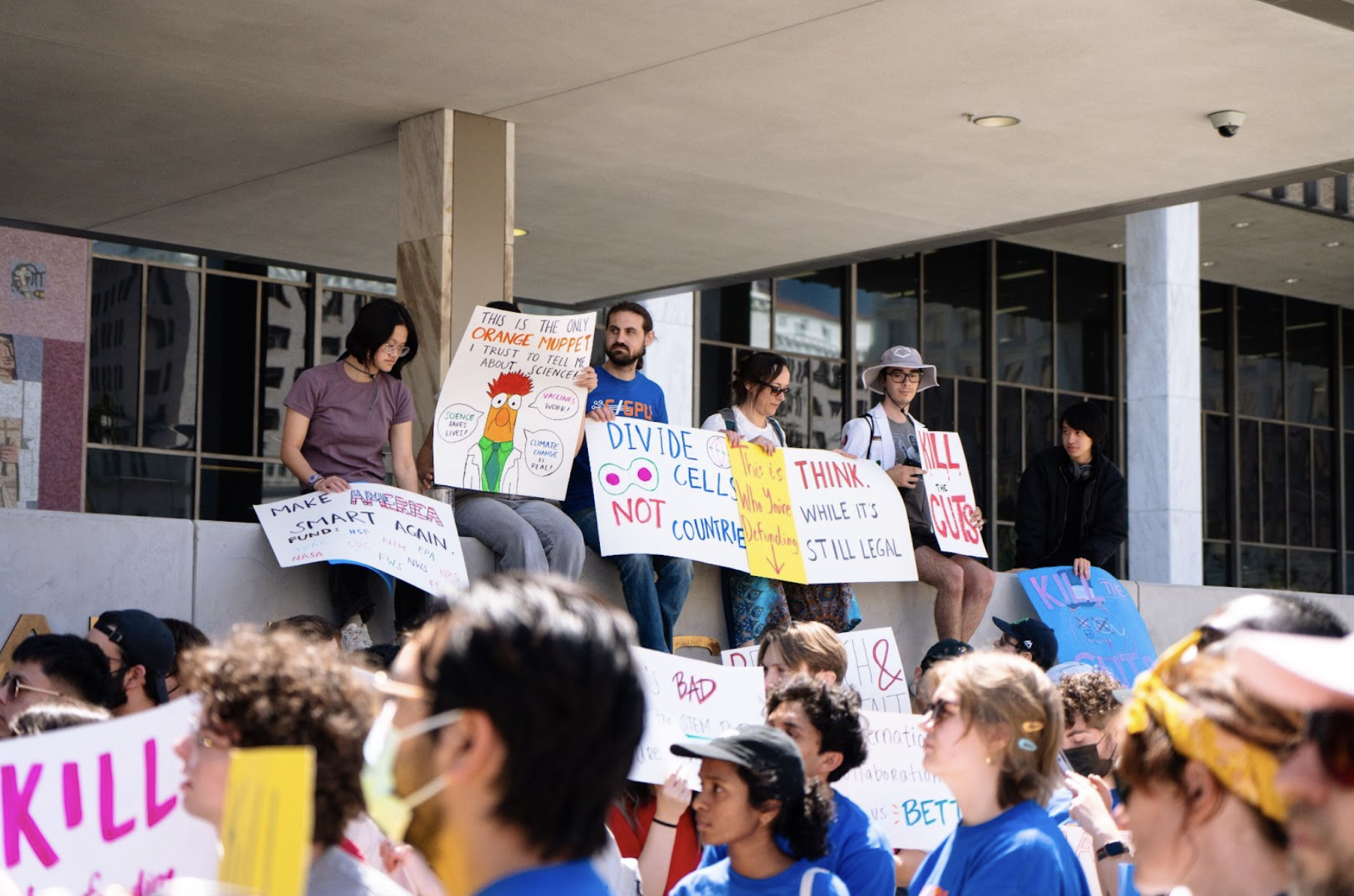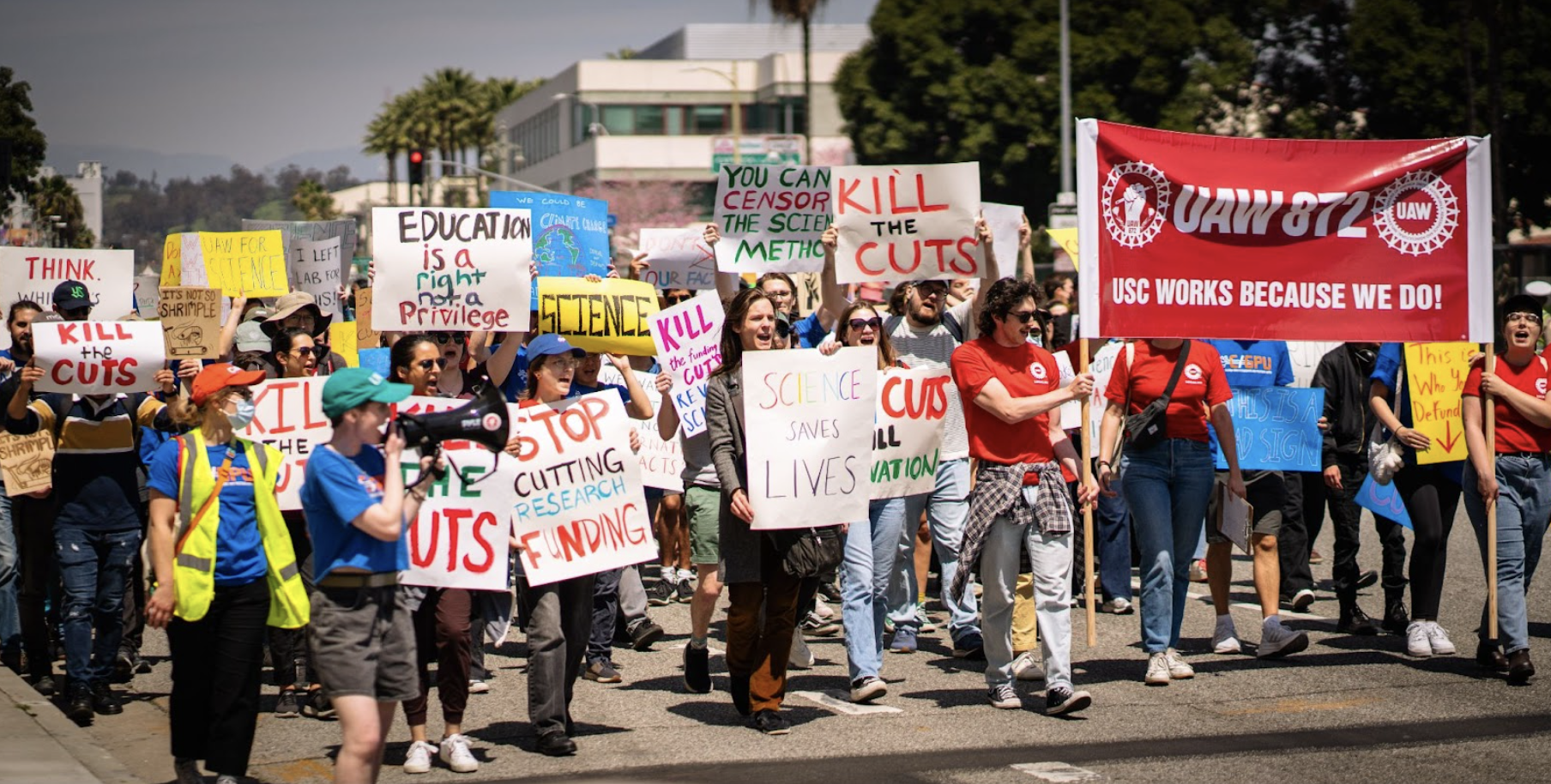Caltech and USC Rally Downtown to "Kill the Cuts"




Protestors from the Caltech (UAW 2478) and USC (UAW 872) contingents march through Downtown Los Angeles, chanting among other messages: “TWO-FOUR-SEVEN-EIGHT, WE PROTECT THE NIH!” “THREE, POINT, ONE, FOUR—FUND SCIENCE, NOT WAR!” and “THE PEOPLE! UNITED! WILL NEVER BE DIVIDED!” All photos courtesy of Alex Ramirez.
On April 8, members of the Caltech community joined forces with union members from USC for the Kill the Cuts rally in Downtown Los Angeles—part of a National Day of Action opposing proposed federal cuts to scientific research funding. From undergraduate students to postdocs, organizers, and union representatives, our presence at the protest was unified, urgent, and unrelenting.
Jasmine Emtage, a fourth-year biology PhD student in the Prober Lab and a member-organizer with UAW 2478 of Caltech Grad Researchers and Postdocs United (CGPU), helped coordinate Caltech’s involvement through her work on the union’s communications and outreach teams. “It started in that we all, clearly, have a personal stake in continuing the funding of scientific research—that’s where it was motivated,” she said. “But also that we’re in contact with our union siblings, both at USC and at the UCs. We started talking in collaboration with each other to stand up against these cuts that are being proposed, asking: ‘What do you want to do as a broader union?’ It was through these conversations that it all started, and this broader coalition was built.”
Thus came the National Day of Action. The rally, which included a march to the 300 North Los Angeles Federal Building, was the first large-scale demonstration that some Caltech participants had ever attended. But Jasmine believes its impact extends far beyond a single day. “We took a campus that was otherwise not so well-versed in unionization and what that meant, and the process of standing up for your fellow workers. I think [Kill the Cuts] demystified it and made it a commonplace expected practice on campus,” Jasmine said. “I think that’s probably the biggest win.”
For Jessie Gan, a Caltech senior studying chemistry and preparing to enter a biology PhD program, the rally struck a deeply personal chord. “This year, I was in the throes of grad school hell,” she said. “You could tell that spots were getting smaller and smaller, and the mood was a lot more tense because people would realize that we’ve all been invited for interviews before funding cuts. The competition, because of the cuts, was a lot higher.” Jessie has witnessed the impact of these cuts not only through her own experience but also through the fellow members of her House. “People in Dabney have had those experiences. It just shows how pervasive the issue is.”
She emphasized the need for graduate students to understand how much these policies impact undergraduates, especially as the research environment grows increasingly hostile. “A number of grad students were surprised to see undergrads show up because we’re always busy. But I told them you shouldn’t be surprised at all because one of the most impacted groups is the senior undergraduate class,” Jessie remarked. “I think students entering grad schools or postdocs trying to get a job right now are some of the most impacted groups.”
Beyond the personal, Jessie is infuriated about what she saw as the cruel, self-defeating nature of these cuts. “What makes me the most mad about these cuts is that a lot of things that have been happening that have been affecting specifically liberal views, but what I think is the cruelest is the DoE defunding energy, or NIH defunding important scientific research across the board—I think they’re bipartisan.”
Like many, Jessie is bewildered by the universally beneficial character of the projects affected. “All people need to agree we need to invest in making more energy more of the time, investing in curing cancer: these things are bipartisan goals. All can agree that we want to make America healthier. Maybe we disagree about how to do that, but we need to agree that research makes that better.” Overall, the rally left Jessie feeling emboldened by solidarity. “Putting that energy toward expressing how we feel about the situation was useful, cathartic—much more so than just sitting in your room and crying.”
Jane Glanzer, a postdoctoral scholar studying gravitational waves, echoed those concerns. “It’s appalling. For the NIH, these cuts could gut work on cancer, mental health, infectious disease—tons of stuff. My NSF funding is okay, but past June, it might be in question. And especially in 2026, we have no idea. In the long term, it’s up in the air if we’re going to have it.”
The rally was Jane’s first union-organized action, which she found both empowering and bittersweet. “It sucks that we have to do it in the first place. But also having the union in place is great. Especially for international students and postdocs, it’s nice that we have this group that will come together and say, ‘Hey, we’re not going to stand for this treatment!’ and things like that.” She added, “It’s also a way to apply pressure to the lawmakers ahead of time to say, ‘Hey, this sort of thing’s really going to impact us.’ Going off, blocking traffic, and circling the Federal Building—I think it makes a statement.”
As explained by Coleman Pinkerton, a UAW organizer with experience across UC campuses, this rally marks only the beginning of a far larger process. “As I see it, obviously nothing is going to be fixed after one rally, one protest, one national day of action. That’s not a material way of thinking,” Coleman observed. “But I think it builds a movement to organize people. If we want to see substantial changes in our system, we need to organize very broadly.”
While prospects for scientific funding remain uncertain, we retain the power to shape that future—as researchers, workers, and members of the public. Along these lines, the Kill the Cuts rally served as a liberating reminder: the value of institutions like Caltech comes from the people who make the science happen. And it’s up to us to decide how that value is used, shared, and defended.
“We all fundamentally know that we’re stronger together,” Jasmine stated. “There’s some inherent appeal in banding together in these events that affect us all. I don’t think our union taught anyone to do that—I think people intrinsically realized that was important, but didn’t realize they had the power to do that. People understand now that they have the power to do these things.”